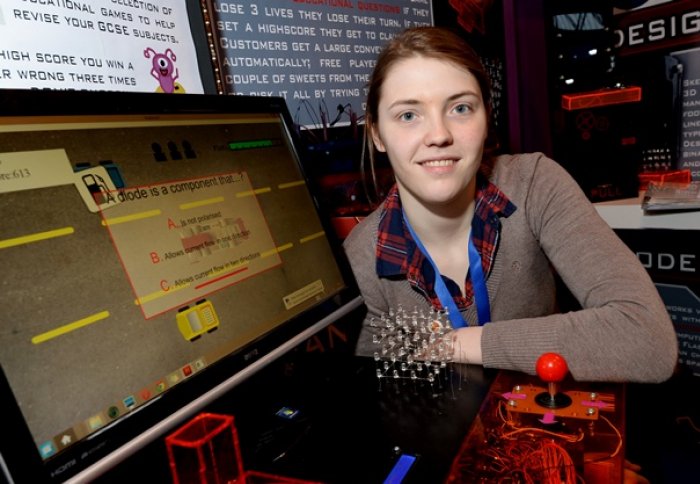Rebecca is Young Engineer of the Year
by Jane Horrell

Rebecca with her arcade machine which she coded and built from scratch
One of our first year undergraduates has been named Young Engineer of the Year at the National Science + Engineering Competition.
Rebecca, who is now a first year student on our Electronics and Information Engineering degree course, received her award at The Big Bang UK Young Scientists & Engineers Fair which took place in the NEC Birmingham in March.
Her 'arcade game' which she built herself from scratch, is designed to encourage other young people to take up science, technology, engineering and maths subjects.
Award winners were given a trophy, £2,000 and an experience prize. Rebecca said, “I’m so happy I’ve won. I’m going to use the money to develop this project further. I’m also really interested in making holograms by using LEDs, so I want to investigate this too.”
Jason Bradbury, a competition judge and host of The Gadget Show, said, “Rebecca encompasses everything that the National Science and Engineering Competition is about – her passion for engineering is irrepressible. Her creation is one of the most original and clever ideas I’ve ever heard of. As a father of three, I can tell you that using computer games to focus young minds on STEM subjects is right on the money.”
The National Science + Engineering Competition began in 2008. The aim of the Competition is to recognise and reward young people’s achievements in all areas of Science, Technology, Engineering and Mathematics (STEM) and by doing so, encourage others to engage with STEM and consider STEM-related career paths. The Competition's finals are held annually at The Big Bang Fair where each finalist displays and demonstrates their project work to visiting school groups and the wider public. By seeing the achievements of their peers, it is hoped that students visiting the fair will be encouraged to engage with STEM themselves.
Article text (excluding photos or graphics) © Imperial College London.
Photos and graphics subject to third party copyright used with permission or © Imperial College London.
Reporter
Jane Horrell
Department of Electrical and Electronic Engineering